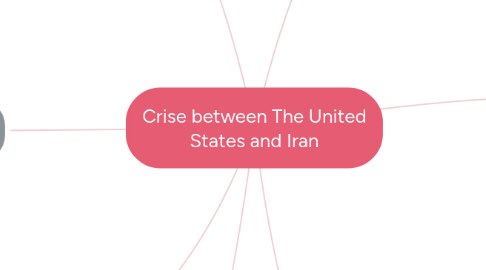Crise between The United States and Iran
by Crevits Richard

1. Consequences
1.1. US may not repeal the nuclear deal as it is a multilateral agreement
1.2. Fear of the American embargo
1.3. Russian diplomacy warns of "escalating tensions"
1.4. A Shiite community united against united nations
1.5. Possible future retaliation against the U.S. Army in Iraq
2. Introduction
2.1. U.S President Donald has decertified the Iran nuclear deal, describing it as against U.S national security interests
2.2. The Iran nuclear deal was the culmination of 13 years of diplomacy and was a major step towards ensuring that Iran's nuclear program is not diverted for military purposes
3. Why Iran is Important ?
3.1. Iran, unlike the Iraq of 2003, is a strong regional power whose influence runs from Iraq and Syria to Lebanon and Yemen
3.2. The world, including the U.S needs Iran's cooperation to fight the Islamic State, particulary in Iraq, where Iranian-controlled Shia militias played a key role in liberating cities
3.3. Iran is an important regional power in the dialogue process as seen in the recently concluded Astana Peace talks
4. Effect on Iran's relations with other countries
4.1. Iran would look for new geopolitical avenues like China to reduce effect of sanctions
4.2. Chinese believe the new sanctions will create valuable opportunities for China's interests in the Middle East
4.3. Iran would look for new geopolitical avenues like China to reduce effect of sanctions
5. Significance of Iran nuclear deals
5.1. The deal is important in ensuring the international nuclear non-proliferation regime and regional peace and stability
5.2. It should have set a model in adressing other nuclear crises
5.3. Iran deal, and other diplomatic achievements is necessary to cpnvince countries like North Korea, that it is possible to create security without acquiring nuclear weapons.
6. Highlights
6.1. Under American law, the administration has to certify that Iran is technically in compliance with the deal, every 90 days
6.2. Now the U.S is refusing to certify the nuclear deal
6.3. All other signatories, as well as the UN, insist that Iran is fully complying
6.4. The deal is a success as it prvented a country with potential nuclear capabilities from developping weapons.
6.5. Donald Trump call it the "worst agreement in American diplomatic history"
6.6. Trump appears to be going by the advise of two key American allies in the region, Israel ans Saudi Arabia
7. Conclusion
7.1. If U.S is serious about non-proliferation, it should use the Iran deal to resolve other complex international conflicts


